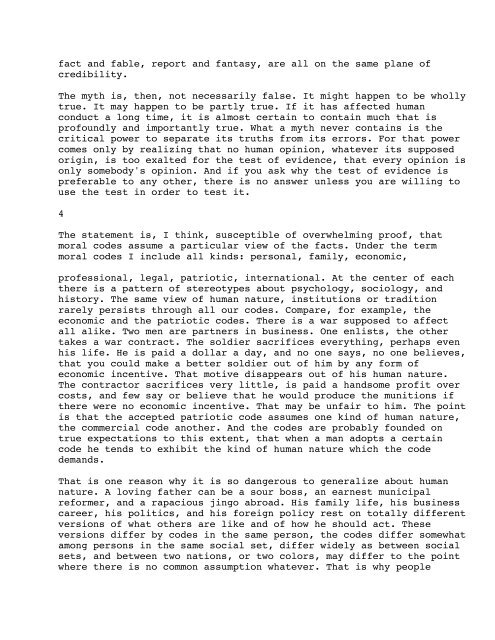PUBLIC OPINION by WALTER LIPPMANN TO FAYE LIPPMANN ...
PUBLIC OPINION by WALTER LIPPMANN TO FAYE LIPPMANN ...
PUBLIC OPINION by WALTER LIPPMANN TO FAYE LIPPMANN ...
You also want an ePaper? Increase the reach of your titles
YUMPU automatically turns print PDFs into web optimized ePapers that Google loves.
fact and fable, report and fantasy, are all on the same plane of<br />
credibility.<br />
The myth is, then, not necessarily false. It might happen to be wholly<br />
true. It may happen to be partly true. If it has affected human<br />
conduct a long time, it is almost certain to contain much that is<br />
profoundly and importantly true. What a myth never contains is the<br />
critical power to separate its truths from its errors. For that power<br />
comes only <strong>by</strong> realizing that no human opinion, whatever its supposed<br />
origin, is too exalted for the test of evidence, that every opinion is<br />
only somebody's opinion. And if you ask why the test of evidence is<br />
preferable to any other, there is no answer unless you are willing to<br />
use the test in order to test it.<br />
4<br />
The statement is, I think, susceptible of overwhelming proof, that<br />
moral codes assume a particular view of the facts. Under the term<br />
moral codes I include all kinds: personal, family, economic,<br />
professional, legal, patriotic, international. At the center of each<br />
there is a pattern of stereotypes about psychology, sociology, and<br />
history. The same view of human nature, institutions or tradition<br />
rarely persists through all our codes. Compare, for example, the<br />
economic and the patriotic codes. There is a war supposed to affect<br />
all alike. Two men are partners in business. One enlists, the other<br />
takes a war contract. The soldier sacrifices everything, perhaps even<br />
his life. He is paid a dollar a day, and no one says, no one believes,<br />
that you could make a better soldier out of him <strong>by</strong> any form of<br />
economic incentive. That motive disappears out of his human nature.<br />
The contractor sacrifices very little, is paid a handsome profit over<br />
costs, and few say or believe that he would produce the munitions if<br />
there were no economic incentive. That may be unfair to him. The point<br />
is that the accepted patriotic code assumes one kind of human nature,<br />
the commercial code another. And the codes are probably founded on<br />
true expectations to this extent, that when a man adopts a certain<br />
code he tends to exhibit the kind of human nature which the code<br />
demands.<br />
That is one reason why it is so dangerous to generalize about human<br />
nature. A loving father can be a sour boss, an earnest municipal<br />
reformer, and a rapacious jingo abroad. His family life, his business<br />
career, his politics, and his foreign policy rest on totally different<br />
versions of what others are like and of how he should act. These<br />
versions differ <strong>by</strong> codes in the same person, the codes differ somewhat<br />
among persons in the same social set, differ widely as between social<br />
sets, and between two nations, or two colors, may differ to the point<br />
where there is no common assumption whatever. That is why people





